
NAB 2023 MESA Round-Up: Signiant, Xperi, Veritone, Fabric, Prime Focus Technologies
LAS VEGAS — More than 50 MESA members exhibited during NAB. Here’s what a few of them had to share at the show.
Signiant
In just four years, Signiant has seen six times growth in its operations, with no end to the jump in sight. There’s just more, bigger files needed to be moved to more places than anyone could have predicted.
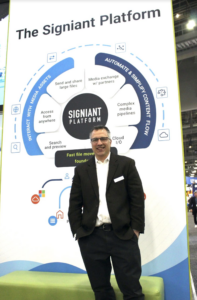 Signiant’s been ready for the challenge.
Signiant’s been ready for the challenge.
“Media operations seem under so much pressure to do more with fewer resources,” said Signiant CMO Jon Finegold. “It’s palpable that there’s mounting pressure to make more media content flow more efficiently. If you’re a vendor who isn’t helping customers do more with less, you’re not innovating.
“The systems are in place and the same pain points exist: you need to be fast, and you need to be reliable. Signiant gives you the agility for you and your partners to work where you want when you want.”
At NAB, Signiant highlighted its latest platform developments, including an increased emphasis on cloud-to-cloud functionality, and “a lot of little things that helps increase efficiency,” Finegold said. That includes upgrades to the Media Engine media management service built into the Signiant Platform, which is proving a boon to live productions. Celebrating its first year of availability, Media Engine allows for simple search, preview, and action around media assets across all Signiant-connected storage, from anywhere in the world. “Productions are working on a growing number of files at both the source and destination,” Finegold said. “Editors halfway around the world need access and it has to happen in seconds.”
And, he added, Signiant’s Jet, a SaaS product for automated file movement geared toward small and medium-sized operations is seeing more uptake thanks to its ability to “do more with less.”
Xperi
For Xperi and its subsidiary DTS, the focus of NAB was in-vehicle content, according to Jeff Jury, GM of connected cars for the company.
“What we’re doing is developing content in a way that’s integrated for the consumer that’s pure, immersive entertainment, taking advantage of the latest technology available,” he said, pointing to AutoStage, the global automotive independent media delivery platform that offers next-gen AI-powered connected radio, audio and video content.
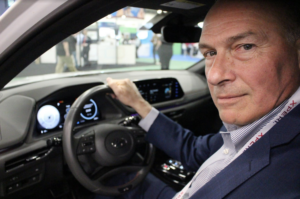 And it’s working: in less than a year AutoStage has been included in more than 50 car models, with another 100 on the way. The technology seamlessly combines linear broadcast with IP-delivered content, offering a deeply personalised, in-vehicle infotainment solution. DTS AutoStage was designed to be both visually rich, safe, and immersive for connected cars, and allows radio broadcasters to retain editorial control of content while offering a new, consistent user experience.
And it’s working: in less than a year AutoStage has been included in more than 50 car models, with another 100 on the way. The technology seamlessly combines linear broadcast with IP-delivered content, offering a deeply personalised, in-vehicle infotainment solution. DTS AutoStage was designed to be both visually rich, safe, and immersive for connected cars, and allows radio broadcasters to retain editorial control of content while offering a new, consistent user experience.
Where the money lies is with the valuable listener insights and analytics the system relays, with Xperi launching a DTS AutoStage Broadcaster Portal just before NAB, offering radio broadcasters access to data on user engagement. Now, every broadcaster can gain insights into how their in-car listeners are engaging with content from the car.
“What sets us apart is personalisation, and this is key to allowing [broadcasters] to help offer that,” Jury said. With the algorithms DTS has that learn with more consumers usage, DTS is poised to make the in-car entertainment experience truly revolutionary. And content owners are responding.
“Through smart TVs and set-top boxes, TV broadcasters have enjoyed the ability to measure audience engagement,” said Pierre Bouvard, chief insights officer for Cumulus Media Westwood One. “The connected car and DTS AutoStage have revolutionised the data possibilities for radio broadcasters, giving them access to in-car data for millions of vehicles to inform programming content and ad strategies.”
Veritone
Enterprise AI software and services firm Veritone has spent years perfecting its generative AI technologies to help monetise media and entertainment workflows and offer content owners the ability to generative new content from existing archives, according to Corey Hill, director of product management for Veriverse at Veritone.
At NAB, Veritone earned the awards to back up its efforts.
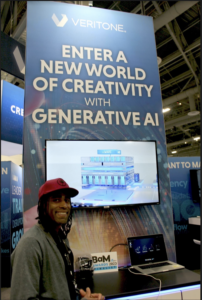 Both the NAB Product of the Year in the AI and Machine Learning category and the IABM BaM (Broadcast and Media) award in the monetisation category belonged to Veritone at the end of NAB week, reflecting the innovation and monetisation efforts for the industry the company has provided.
Both the NAB Product of the Year in the AI and Machine Learning category and the IABM BaM (Broadcast and Media) award in the monetisation category belonged to Veritone at the end of NAB week, reflecting the innovation and monetisation efforts for the industry the company has provided.
“We’ve helped content companies monetise new content from workflows, with scaled protection and additional security layers, ensuring that content is not repurposed incorrectly,” Hill said. “We’re helping to generate new and engaging content for advertising and social media.”
From using language models to create a season recap to fully synthetic voiceovers using just a sample of human voices, Veritone’s technologies are changing how content creators make entertainment.
Veritone Generative AI is an enterprise-grade Platform-as-a-Service (PaaS) that natively supports and orchestrates public large language models, including GPT-3 and ChatGPT, along with domain-specific large language models, and is being leveraged in client data, media, and communication workflows.
Coming into NAB, Veritone announced it had extended its partnership with Augusta National and the Masters Tournament, with the golfing organisation using Veritone’s AI-based technology and licensing services, including Veritone Digital Media Hub (DMH), an asset management and monetisation solution, to ensure footage is captured, archived and enriched for future use and discovery.
Fabric
A recent acquisition. A major partnership. Another IBC Accelerator project. Oh, and an NAB Streaming Product of the Year 2023 award. Fabric came out of NAB with plenty to celebrate.
“As anything, this industry has continued to evolve,” said Fabric CEO Rob Delf. “We’re here to show how Fabric has evolved.”
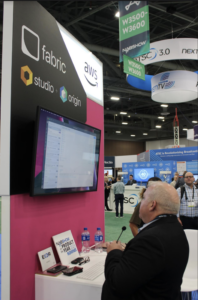 Start with Fabric’s January acquisition of the industry’s king of entertainment trailers, Internet Video Archive (IVA), a company which also boasts a huge baseline catalog of film and television metadata, a perfect fit for Fabric, whose clients (Warner Bros. Discovery, Paramount, HBO, MGM, FOX, etc.) now can instantly match titles to the IVA library and enrich what they own. Combined with Fabric, the acquisition helps clients gain more insights into their marketing, and verification of their licensing across streaming platforms.
Start with Fabric’s January acquisition of the industry’s king of entertainment trailers, Internet Video Archive (IVA), a company which also boasts a huge baseline catalog of film and television metadata, a perfect fit for Fabric, whose clients (Warner Bros. Discovery, Paramount, HBO, MGM, FOX, etc.) now can instantly match titles to the IVA library and enrich what they own. Combined with Fabric, the acquisition helps clients gain more insights into their marketing, and verification of their licensing across streaming platforms.
Then there’s the recently announced strategic partnership between IMDb and Fabric, resulting in Fabric customers being able to procure licensed data from IMDb directly via their existing relationship with Fabric.
That’s just one agreement and one fee directly with Fabric vs. maintaining multiple agreements and payments, resulting in cost and resource efficiencies. Fabric’s licensing of IMDb data and information is fulfilled through AWS Data Exchange.
And, following its crucial work with the Cloud Localisation Blueprint, Fabric is now helping spearhead another IBC Accelerator-based project, the Authenticated Data Standard, which would allow content owners to verify and authenticate their content data and imagery, and then publish it to third-party sources. “There’s no standard for sharing data and marketing data shouldn’t come from a third-party source,” Delf said. “This would be the source of truth of data.”
Prime Focus Technologies
Sometimes the acquisition of a company means a loss of that company’s traditions and future. Ramki Sankaranarayanan, founder and CEO of Prime Focus Technologies, sees the opposite for his company, following the April 13 announcement that visual entertainment services firm DNEG would acquire Prime Focus and its technology platforms.
“Fundamentally, this is a response to scale in the marketplace, a supply chain consolidation for pre-production, VFX and distribution, and the two companies together will be able to provide more value for the consumer,” he said at NAB. “More and more is going to the cloud and while customers are getting bigger and bigger, they’re also fewer and fewer. The same happens with vendors.
“This acquisition wasn’t for cost synergies but about improving the business.”
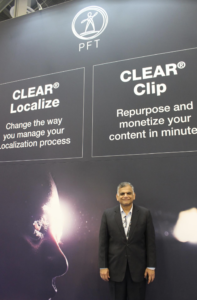 The proof is DNEG’s plans: every one of Prime Focus’s 1,700-plus employees is coming over in the acquisition, to keep running and improving on the cloud-based software and artificial intelligence (AI) technology for the media and entertainment industry that Prime Focus is known for.
The proof is DNEG’s plans: every one of Prime Focus’s 1,700-plus employees is coming over in the acquisition, to keep running and improving on the cloud-based software and artificial intelligence (AI) technology for the media and entertainment industry that Prime Focus is known for.
DNEG is adding on Prime Focus’s tech, including the media workflow and automation software suite CLEAR, and purpose-built AI platform CLEAR AI, which provide studios, broadcasters, and service providers solutions to help manage content, video collaboration and automation in the production and distribution process.
Acquiring the SaaS business of PFT will make DNEG’s stand out as an end-to-end solutions provider, enabling its expansion into media tech and distribution services, including fulfilment, localisation, and marketing. DNEG’s worldwide M&E client base will better realise the financial, operational, and strategic benefits of managing the entire lifecycle of their content with one trusted partner, the companies said.
“DNEG is the entertainment industry’s go-to premium turnkey solutions provider thanks to organic market share expansion and key strategic acquisitions, including today’s MOU with PFT,” said Namit Malhotra, DNEG chairman and CEO. “In concert with DNEG’s deals for several lines of production and post-production services from Prime Focus Limited earlier this year, and our latest studio opening in Sydney, DNEG is truly a global, 24/7 force in the business. DNEG continues to offer unmatched quality, innovation, and end-to-end capabilities to meet the visual effects, animation, pre- and post-production, distribution fulfilment services, and media asset management needs of all clients around the globe.”
